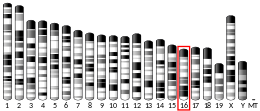PRM1
Protamine 1 is a protein that in humans is encoded by the PRM1 gene.[5]
| PRM1 | |||||||||||||||||||||||||
|---|---|---|---|---|---|---|---|---|---|---|---|---|---|---|---|---|---|---|---|---|---|---|---|---|---|
| |||||||||||||||||||||||||
| Identifiers | |||||||||||||||||||||||||
| Aliases | PRM1, CT94.1, P1, protamine 1 | ||||||||||||||||||||||||
| External IDs | OMIM: 182880 MGI: 97765 GeneCards: PRM1 | ||||||||||||||||||||||||
| |||||||||||||||||||||||||
| |||||||||||||||||||||||||
| |||||||||||||||||||||||||
| Orthologs | |||||||||||||||||||||||||
| Species | Human | Mouse | |||||||||||||||||||||||
| Entrez | |||||||||||||||||||||||||
| Ensembl | |||||||||||||||||||||||||
| UniProt | |||||||||||||||||||||||||
| RefSeq (mRNA) | |||||||||||||||||||||||||
| RefSeq (protein) | |||||||||||||||||||||||||
| Location (UCSC) | Chr 16: 11.28 – 11.28 Mb | Chr 16: 10.8 – 10.81 Mb | |||||||||||||||||||||||
| PubMed search | [3] | [4] | |||||||||||||||||||||||
| Wikidata | |||||||||||||||||||||||||
| |||||||||||||||||||||||||
References
- GRCh38: Ensembl release 89: ENSG00000175646 - Ensembl, May 2017
- GRCm38: Ensembl release 89: ENSMUSG00000022501 - Ensembl, May 2017
- "Human PubMed Reference:". National Center for Biotechnology Information, U.S. National Library of Medicine.
- "Mouse PubMed Reference:". National Center for Biotechnology Information, U.S. National Library of Medicine.
- "Entrez Gene: Protamine 1". Retrieved 2020-03-17.
Further reading
- Tanaka H, Miyagawa Y, Tsujimura A, Matsumiya K, Okuyama A, Nishimune Y (February 2003). "Single nucleotide polymorphisms in the protamine-1 and -2 genes of fertile and infertile human male populations". Molecular Human Reproduction. 9 (2): 69–73. doi:10.1093/molehr/gag010. PMID 12569175.
- Tanaka H, Miyagawa Y, Tsujimura A, Matsumiya K, Okuyama A, Nishimune Y (February 2003). "Single nucleotide polymorphisms in the protamine-1 and -2 genes of fertile and infertile human male populations". Molecular Human Reproduction. 9 (2): 69–73. doi:10.1093/molehr/gag010. PMID 12569175.
- Aoki VW, Christensen GL, Atkins JF, Carrell DT (November 2006). "Identification of novel polymorphisms in the nuclear protein genes and their relationship with human sperm protamine deficiency and severe male infertility". Fertility and Sterility. 86 (5): 1416–22. doi:10.1016/j.fertnstert.2006.04.033. PMID 16989827.
- Aoki VW, Christensen GL, Atkins JF, Carrell DT (November 2006). "Identification of novel polymorphisms in the nuclear protein genes and their relationship with human sperm protamine deficiency and severe male infertility". Fertility and Sterility. 86 (5): 1416–22. doi:10.1016/j.fertnstert.2006.04.033. PMID 16989827.
- Aoki VW, Liu L, Jones KP, Hatasaka HH, Gibson M, Peterson CM, Carrell DT (November 2006). "Sperm protamine 1/protamine 2 ratios are related to in vitro fertilization pregnancy rates and predictive of fertilization ability". Fertility and Sterility. 86 (5): 1408–15. doi:10.1016/j.fertnstert.2006.04.024. PMID 17011555.
- Ravel C, Chantot-Bastaraud S, El Houate B, Berthaut I, Verstraete L, De Larouziere V, et al. (July 2007). "Mutations in the protamine 1 gene associated with male infertility". Molecular Human Reproduction. 13 (7): 461–4. doi:10.1093/molehr/gam031. PMID 17494104.
- Depa-Martynów M, Kempisty B, Lianeri M, Jagodziński PP, Jedrzejczak P (2007). "Association between fertilin beta, protamines 1 and 2 and spermatid-specific linker histone H1-like protein mRNA levels, fertilization ability of human spermatozoa, and quality of preimplantation embryos". Folia Histochemica Et Cytobiologica. 45 Suppl 1: S79-85. PMID 18292840.
- Kempisty B, Depa-Martynow M, Lianeri M, Jedrzejczak P, Darul-Wasowicz A, Jagodzinski PP (2007). "Evaluation of protamines 1 and 2 transcript contents in spermatozoa from asthenozoospermic men". Folia Histochemica Et Cytobiologica. 45 Suppl 1: S109-13. PMID 18292846.
- Hammoud S, Emery BR, Aoki VW, Carrell DT (2007). "Identification of genetic variation in the 5' and 3' non-coding regions of the protamine genes in patients with protamine deregulation". Archives of Andrology. 53 (5): 267–74. doi:10.1080/01485010701569890. PMID 18309899.
This article is issued from Wikipedia. The text is licensed under Creative Commons - Attribution - Sharealike. Additional terms may apply for the media files.



